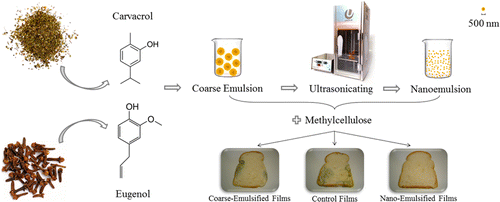Essential oils have boomed in popularity as more people seek out alternatives to replace their synthetic cleaning products, anti-mosquito sprays and medicines. Now scientists are tapping them as candidates to preserve food in a more consumer-friendly way. A study from ACS' Journal of Agricultural and Food Chemistry reports the development of new edible films containing oils from clove and oregano that preserve bread longer than commercial additives.
Nilda de F. F. Soares and colleagues note that the search for new ways to keep packaged food from spoiling has led some scientists to essential oils, which can keep bacteria and mold at bay. Oils from clove and oregano had already been incorporated into edible films. But scientists still needed to optimize the effectiveness of these films and test them under real-life conditions for other uses. So Soares's team decided to test how well different edible films with clove and oregano essential oils could maintain bread's freshness and see how they measured up against a commercial antimicrobial agent. Bread is a common staple around the world and is often kept fresh with calcium propionate. Though naturally occurring, some research suggesting negative side effects have tarnished its popularity.
The scientists bought preservative-free bread and placed slices in plastic bags with or without essential oil-infused edible films. To some slices, they added a commercial preservative containing calcium propionate.
After 10 days, the latter additive lost its effectiveness, but the edible films made with small droplets of the oils continued to slow mold growth.
More information: "Edible Films from Methylcellulose and Nanoemulsions of Clove Bud (Syzygium aromaticum) and Oregano (Origanum vulgare) Essential Oils as Shelf Life Extenders for Sliced Bread" J. Agric. Food Chem., 2014, 62 (22), pp 5214–5219. DOI: 10.1021/jf501055f
Abstract
Consumers are increasingly demanding foods with lower synthetic preservatives. Plant essential oils are natural compounds with remarkable antimicrobial properties and may be incorporated as emulsions into water-soluble polymers to form antimicrobial films. Coarse emulsions (diameters of 1.3–1.9 μm) and nanoemulsions (diameters of 180–250 nm) of clove bud (Syzygium aromaticum) and oregano (Origanum vulgare) essential oils were produced through low-speed mixing and ultrasonication, respectively. Methylcellulose was added for film-forming purposes. Both essential oils reduced the rigidity and increased the extensibility of the methylcellulose films, effects that were even more pronounced for nanodroplets. Both essential oils lessened the counts of yeasts and molds in sliced bread during 15 days, and droplet size reduction provided a further improvement in antimicrobial properties. Due to increased bioavailability, less preservative content might be used and still deliver the same antimicrobial efficiency if encapsulated in smaller particles.
Journal information: Journal of Agricultural and Food Chemistry
Provided by American Chemical Society




















